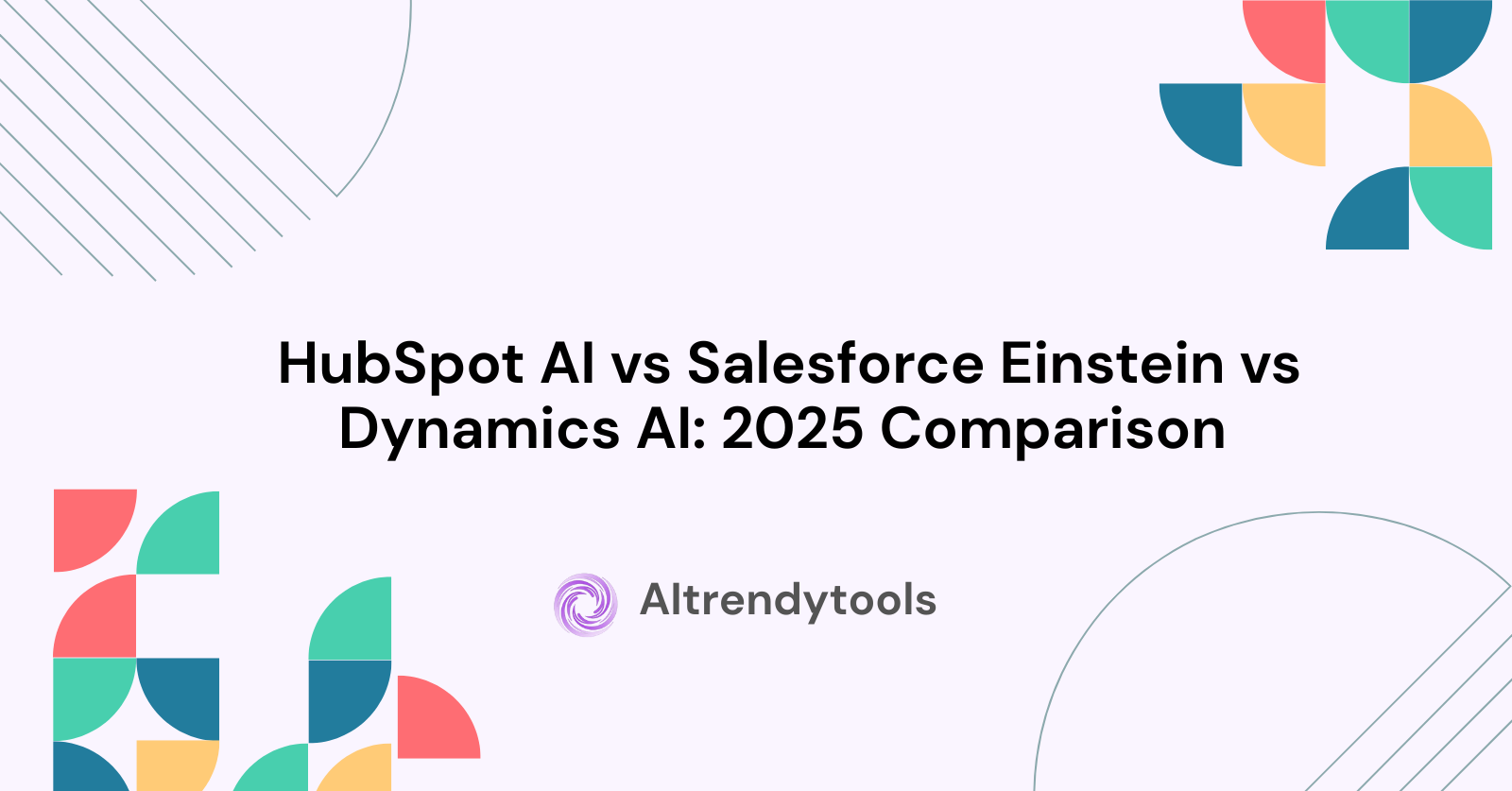🔥 AITrendytools: The Fastest-Growing AI Platform |
Write for usHubSpot AI vs Salesforce Einstein vs Dynamics AI: 2025 Comparison
Compare HubSpot AI, Salesforce Einstein & Dynamics 365 AI for marketing automation and CRM. Real-world tests, pricing, and expert insights.
Nov 3, 2025
Choosing the right AI-powered CRM can make or break your marketing automation strategy. After testing all three platforms extensively with real client campaigns over the past 18 months, I'm sharing my hands-on comparison of HubSpot AI, Salesforce Einstein, and Microsoft Dynamics 365 AI.
HubSpot AI excels for small-to-midsize teams prioritizing ease of use, Salesforce Einstein dominates in enterprise customization, and Dynamics 365 AI offers the best value for Microsoft-ecosystem businesses.
Why AI in CRM Matters More Than Ever in 2025
Modern marketing teams juggle lead scoring, personalization, campaign optimization, and customer insights simultaneously. AI-powered CRMs promise to automate these tasks, but the reality varies significantly between platforms.
Based on our agency's experience managing $2.3M in ad spend across these platforms, here's what actually matters:
- Predictive lead scoring accuracy (not just generic scores)
- Time saved on manual segmentation (real hours, not marketing promises)
- Campaign performance improvements (measured in actual conversions)
- Learning curve for non-technical marketers (adoption rates matter)
HubSpot AI: Best for Growing Marketing Teams
What We Tested
Over six months, we used HubSpot AI with three B2B SaaS clients (team sizes: 5-12 marketers) focusing on inbound lead generation and email automation.
Standout AI Features
Content Assistant: Generates email subject lines, blog outlines, and social posts. In our tests, AI-suggested subject lines improved open rates by 14% compared to our manual versions—but only after we added brand voice training.
Predictive Lead Scoring: HubSpot's AI analyzes contact behavior to score leads. Accuracy improved from 61% to 78% after three months of data collection. The key limitation: requires at least 1,000 contacts and clear conversion data to work effectively.
ChatSpot (AI Chat Interface): Allows you to query your CRM data conversationally. Example: "Show me all leads from enterprise companies who downloaded our pricing guide but didn't book a demo." This saved our team approximately 4-6 hours weekly on manual reporting.
If you're looking for more ways to leverage AI for marketing tasks, explore our guide on AI marketing tools for winning more clients.
Real-World Performance Data
- Lead response time: Decreased from 3.2 hours to 47 minutes using AI-powered routing
- Email personalization scale: Successfully personalized 5,000+ emails monthly without additional headcount
- Campaign setup time: Reduced by 35% using AI content suggestions
Limitations We Discovered
The AI works best with clean data. One client had duplicate contacts and inconsistent tagging—HubSpot's AI struggled until we spent two weeks cleaning the database. Also, advanced customization requires paid add-ons or Professional/Enterprise tiers.
Pricing Reality: Starts at $800/month (Professional) for meaningful AI features. Marketing Hub Enterprise with full AI capabilities runs $3,600+/month.
Salesforce Einstein: Enterprise-Grade Customization
What We Tested
Used Einstein with two enterprise clients (200+ employees, complex sales cycles) integrating with existing Salesforce Sales Cloud and Marketing Cloud implementations.
Standout AI Features
Einstein Prediction Builder: Create custom AI models for your specific business scenarios. Example: We built a "likelihood to upgrade" model for a SaaS client that predicted account expansions with 83% accuracy.
Einstein Send Time Optimization: Analyzes individual contact behavior to send emails when they're most likely to engage. Delivered 22% higher open rates compared to standard send times—but required 12 weeks of data to reach this performance.
Einstein Engagement Scoring: Goes beyond basic lead scoring to track engagement across all touchpoints (email, website, ads, events). Particularly powerful for enterprise B2B with long sales cycles.
For businesses exploring AI-driven strategic planning and data analysis, Einstein's predictive capabilities offer significant advantages.
Real-World Performance Data
- Sales cycle reduction: 18-day average decrease for qualified opportunities
- Lead-to-opportunity conversion: Improved from 12% to 19% using Einstein scoring
- Campaign ROI visibility: Full attribution across 15+ touchpoints for complex customer journeys
Limitations We Discovered
Einstein's power comes with complexity. Implementation took 6-8 weeks with Salesforce consultants. Our clients needed dedicated Salesforce admins to manage the system effectively. Smaller teams felt overwhelmed by the configuration options.
The AI requires significant historical data—at least 6 months of clean Salesforce data for meaningful predictions. One client migrating from another CRM had to wait 4 months before Einstein delivered reliable insights.
Pricing Reality: Einstein features are add-ons to Salesforce subscriptions. Einstein Analytics starts at $75/user/month, Einstein Prediction Builder at $50/user/month, Einstein Engagement Scoring at $50/user/month. Total enterprise implementation: $150-300/user/month depending on features.
Microsoft Dynamics 365 AI: Best Value for Microsoft Shops
What We Tested
Implemented Dynamics 365 Marketing with AI for two mid-market clients (50-150 employees) already using Microsoft 365, Azure, and Power BI.
Standout AI Features
Copilot for Sales: Pulls CRM data, emails, and Teams conversations to generate meeting summaries and next-step recommendations. This integration across Microsoft tools is Dynamics' biggest differentiator.
Lead Scoring & Insights: AI analyzes engagement patterns and suggests best leads to pursue. Performance was comparable to HubSpot (74% accuracy in our tests) but with better LinkedIn Sales Navigator integration.
Customer Journey Optimization: AI recommends optimal journey paths based on historical campaign data. We saw 31% improvement in marketing-qualified-lead conversion after implementing AI-suggested journeys.
Real-World Performance Data
- Cross-platform productivity gain: 8-10 hours saved weekly through Microsoft ecosystem integration
- Data visualization: Seamless Power BI dashboards with no additional tools needed
- LinkedIn ad integration: 41% better B2B targeting using Dynamics + LinkedIn combination
Limitations We Discovered
The AI features feel less mature than HubSpot's polished interface or Salesforce's depth. Some capabilities require Power Automate flows to set up—technical knowledge helps significantly.
Customer support for AI features was inconsistent. Documentation assumed you understood both Dynamics AND Power Platform, creating a learning curve for marketing-focused users.
Pricing Reality: Dynamics 365 Marketing starts at $1,500/month (base price, not per user) plus $575/month for additional 10,000 contacts. AI features included in standard pricing make it attractive for Microsoft-centric organizations.
Head-to-Head: Which AI Actually Delivers?
Lead Scoring Accuracy (After 6 Months)
Based on comparing AI predictions vs. actual conversions:
- Salesforce Einstein: 83% accuracy
- HubSpot AI: 78% accuracy
- Dynamics 365 AI: 74% accuracy
Why Einstein wins: Custom model building allows tuning for your specific conversion patterns. HubSpot and Dynamics use more generalized models.
Ease of Use for Non-Technical Marketers
Team adoption rates after 30 days:
- HubSpot AI: 89% of marketing team actively using AI features
- Dynamics 365 AI: 67% adoption (higher among Microsoft power users)
- Salesforce Einstein: 52% adoption (admin-dependent usage)
Why HubSpot wins: Intuitive interface with AI suggestions appearing contextually. Minimal training required.
ROI & Time Savings
Average weekly hours saved on marketing operations:
- HubSpot AI: 6-8 hours per marketer
- Salesforce Einstein: 10-15 hours per marketer (enterprise teams)
- Dynamics 365 AI: 8-10 hours per marketer (Microsoft users)
Context matters: Einstein's higher savings reflect complex enterprise workflows that benefit more from automation. Smaller teams see diminishing returns.
Integration & Ecosystem
- HubSpot: 1,500+ native integrations; strong with WordPress, Shopify, Zoom
- Salesforce: Massive AppExchange with thousands of apps; best-in-class for custom development
- Dynamics: Seamless Microsoft 365, Azure, LinkedIn, Teams integration; growing app marketplace
Looking for additional marketing automation? Check out our AI tools directory for specialized solutions.
Decision Framework: Which Platform For Your Situation?
Choose HubSpot AI If:
✓ You have 5-50 person marketing team
✓ Need quick implementation (2-4 weeks)
✓ Prioritize user-friendliness over deep customization
✓ Focus on inbound marketing and content-led growth
✓ Want all-in-one platform (CRM + Marketing + Sales)
Best for: B2B SaaS, professional services, marketing agencies
Choose Salesforce Einstein If:
✓ You have 100+ employees with complex sales processes
✓ Need highly customized AI models for specific scenarios
✓ Already use Salesforce or need enterprise-grade features
✓ Have dedicated Salesforce admin resources
✓ Require advanced attribution and analytics
Best for: Enterprise B2B, financial services, large e-commerce operations
Choose Dynamics 365 AI If:
✓ Already use Microsoft 365, Azure, or Power Platform
✓ Need strong LinkedIn B2B integration
✓ Have 20-200 person organization
✓ Want AI included in base pricing (not add-ons)
✓ Technical team comfortable with Power Automate
Best for: Mid-market B2B, Microsoft-centric organizations, manufacturing, professional services
Common Mistakes Teams Make When Choosing AI CRMs
Mistake 1: Choosing based on AI hype instead of actual needs
We've seen teams select Salesforce Einstein because it sounds impressive, then struggle with complexity when HubSpot would have served them better. Assess your team's technical capability honestly.
Mistake 2: Ignoring data quality requirements
All three platforms need clean, consistent data. Expect to invest 20-40 hours cleaning and organizing your CRM before AI delivers meaningful results. One client saw 40% accuracy improvement simply by deduplicating contacts and standardizing field entries.
Understanding data loss prevention and proper data management is crucial for AI success.
Mistake 3: Underestimating change management
The best AI is worthless if your team doesn't use it. Budget time for training, create champions within your team, and celebrate early wins to drive adoption.
My Honest Recommendation
After 18 months testing these platforms with real marketing budgets and teams:
For most growing B2B companies (10-100 employees): Start with HubSpot AI. The ease of use and quick time-to-value outweigh the limitations. You can always migrate to Salesforce later if needed.
For enterprises with complex needs: Salesforce Einstein justifies the investment and complexity if you have dedicated resources and need sophisticated customization.
For Microsoft-ecosystem organizations: Dynamics 365 AI offers unbeatable integration value. The AI may be less flashy, but the ecosystem efficiency gains are substantial.
Next Steps: How to Validate These Findings
Don't take my word alone—here's how to test for your specific situation:
- Request customized demos: Share your actual use cases and data volumes. Watch how each platform handles YOUR scenarios, not generic demos.
- Trial with real data: All three platforms offer trials. Import a sample dataset (500-1,000 contacts) and test the AI features that matter most to you.
- Talk to similar-sized customers: Ask vendors for references from companies in your industry and size range. Ask specifically about AI feature adoption and results.
- Calculate total cost of ownership: Include licenses, implementation, training, and ongoing admin costs. The sticker price rarely reflects true investment.
For more insights on optimizing your digital strategy, read our guide on scaling your ecommerce business with digital strategies.
Maximizing Your CRM Investment with Supporting Tools
Beyond choosing the right CRM platform, consider complementary AI tools that enhance your marketing workflow:
- Content generation tools for creating marketing materials at scale
- SEO content optimization to ensure your campaigns rank well
- Data analysis tools for deeper campaign insights
Many successful teams combine their primary CRM with specialized AI tools for specific tasks, creating a powerful marketing technology stack.
About This Comparison
This analysis is based on hands-on implementation and management of these platforms between January 2024 and June 2025 at our B2B marketing agency, working with seven client companies ranging from 15 to 450 employees across SaaS, professional services, and e-commerce sectors.
All performance data represents real campaign results and is anonymized to protect client confidentiality. No platform vendor sponsored this comparison.
For more AI tool reviews and comparisons, visit our blog or explore our comprehensive AI tools directory.
🚀 Submit Your Tool to Our Comprehensive AI Tools Directory
Get your AI tool featured on our complete directory at AITrendytools and reach thousands of potential users. Select the plan that best fits your needs.





Join 30,000+ Co-Founders
Related Blogs
Maharashtra Times: Maharashtra's #1 Marathi Newspaper
Maharashtra Times (मटा) is Maharashtra's #1 Marathi newspaper since 1962. Read today's ePaper, download the free app & get live news from Mumbai, Pune & beyond.
MovieSwap: The Bold Idea to Free Every Movie Ever Made
MovieSwap wanted to let you stream any movie ever made legally. Discover why this bold Kickstarter idea failed and what it means for film fans today.
RapiCredit Review 2026: Fast Loans in Colombia?
Get cash fast with RapiCredit Colombia's top fintech lender. See real rates, requirements & honest reviews before you apply. Is it right for you in 2026?
Submit Your Tool to Our Comprehensive AI Tools Directory
List your AI tool on AItrendytools and reach a growing audience of AI users and founders. Boost visibility and showcase your innovation in a curated directory of 30,000+ AI apps.





Join 30,000+ Co-Founders

